JohnKeats约翰济慈
- 格式:ppt
- 大小:296.00 KB
- 文档页数:24

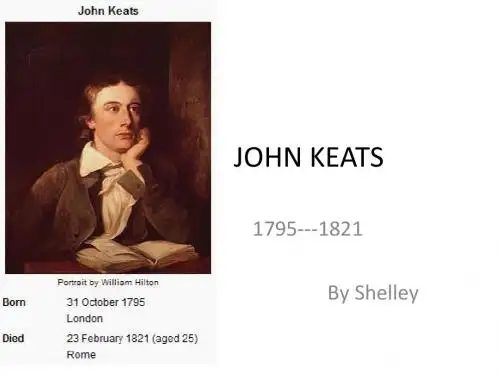
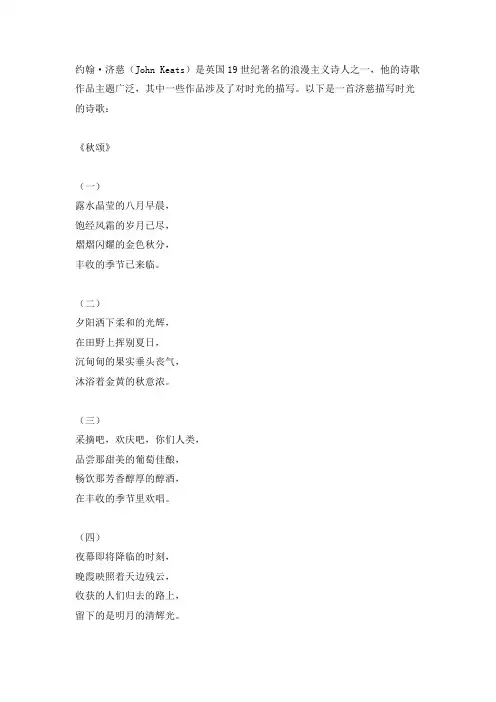
约翰·济慈(John Keats)是英国19世纪著名的浪漫主义诗人之一,他的诗歌作品主题广泛,其中一些作品涉及了对时光的描写。
以下是一首济慈描写时光的诗歌:
《秋颂》
(一)
露水晶莹的八月早晨,
饱经风霜的岁月已尽,
熠熠闪耀的金色秋分,
丰收的季节已来临。
(二)
夕阳洒下柔和的光辉,
在田野上挥别夏日,
沉甸甸的果实垂头丧气,
沐浴着金黄的秋意浓。
(三)
采摘吧,欢庆吧,你们人类,
品尝那甜美的葡萄佳酿,
畅饮那芳香醇厚的醇酒,
在丰收的季节里欢唱。
(四)
夜幕即将降临的时刻,
晚霞映照着天边残云,
收获的人们归去的路上,
留下的是明月的清辉光。
(五)
时光荏苒不停歇,
季节更迭亦如斯,
让我们珍惜每一个时刻,把握美好的金秋时光。
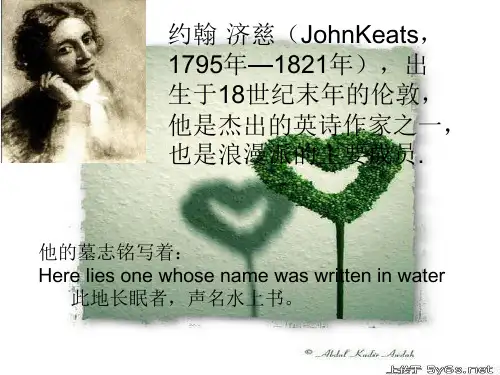
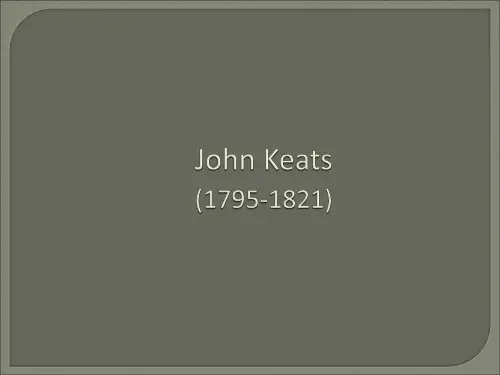
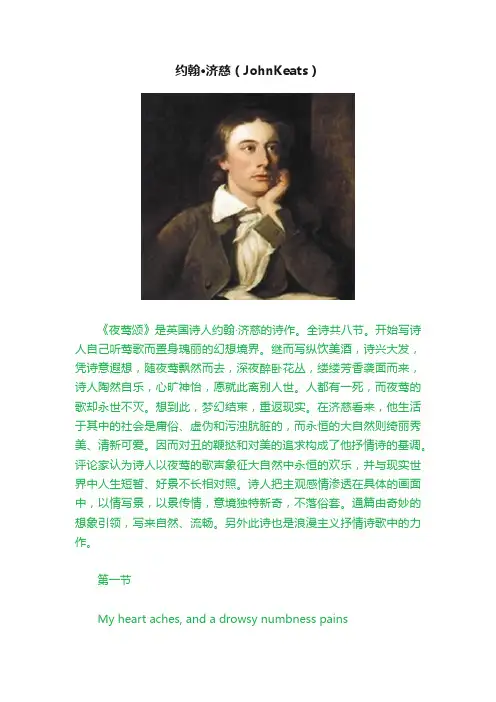
约翰·济慈(JohnKeats)《夜莺颂》是英国诗人约翰·济慈的诗作。
全诗共八节。
开始写诗人自己听莺歌而置身瑰丽的幻想境界。
继而写纵饮美酒,诗兴大发,凭诗意遐想,随夜莺飘然而去,深夜醉卧花丛,缕缕芳香袭面而来,诗人陶然自乐,心旷神怡,愿就此离别人世。
人都有一死,而夜莺的歌却永世不灭。
想到此,梦幻结束,重返现实。
在济慈看来,他生活于其中的社会是庸俗、虚伪和污浊肮脏的,而永恒的大自然则绮丽秀美、清新可爱。
因而对丑的鞭挞和对美的追求构成了他抒情诗的基调。
评论家认为诗人以夜莺的歌声象征大自然中永恒的欢乐,并与现实世界中人生短暂、好景不长相对照。
诗人把主观感情渗透在具体的画面中,以情写景,以景传情,意境独特新奇,不落俗套。
通篇由奇妙的想象引领,写来自然、流畅。
另外此诗也是浪漫主义抒情诗歌中的力作。
第一节My heart aches, and a drowsy numbness painsMy sense, as though of hemlock I had drunk, Or emptied some dull opiate to the drainsOne minute past, and Lethe-wards had sunk:'Tis not through envy of thy happy lot,But being too happy in thine happiness --That thou, light winged Dryad of the trees,In some melodious plotOf beechen green, and shadows numberless, Singest of summer in full-throated ease.第二节O, for a draught of vintage! that hath been Cool'd a long age in the deep-delved earth, Tasting of Flora and the country green, Dance, and Provencal song, and sunburnt mirth! O for a beaker full of the warm SouthFull of the true, the blushful Hippocrene,With beaded bubbles winking at the brim,And purple-stained mouth,That I might drink, and leave the world unseen, And with thee fade away into the forest dim.第三节Fade far away, dissolve, and quite forgetWhat thou amongst the leaves hast never known, The weariness, the fever, and the fretHere, where men sit and hear each other groan; Where palsy shakes a few, sad, last grey hairs. Where youth grows pale, and spectre-thin,and dies; Where nut to think is to be full of sorrowAnd leaden-eyed despairs;Where Beauty cannot keep her lustrous eyes,Or new Love pine at thembeyond to-morrow.第四节Away! away! for I will fly to thee,Not charioted by Bacchus and his pards,But on the viewless wings of Poesy,Though the dull brain perplexes and retards. Already with thee! tender is the night,And haply the Queen-Moon is on her throne, Clustered around by all her starry Fays;But here there is no light,Save what from heaven is with the breezes blown Through verdurous glooms and winding mossy ways.第五节I cannot see what flowers are at my feet,Nor what soft incensehangs upon the boughs,But, in embalmed darkness, guess each sweet Wherewith the seasonable month endows The grass, the thicket, and the fruit-tree wild--White hawthorn, and the pastoral eglantine; Fast fading violets covered up in leaves;And mid-May's eldest child,The coming musk-rose, full of dewy wine,The murmurous haunt of flies on summer eves.第六节Darkling I listen; and for many a timeI have been half in love with easeful Death, Called him soft names in many a mused rhyme, To take into the air my quiet breath;Now more than ever seems it rich to die,To cease upon the midnight with no pain,While thou art pouring forth thy soul abroadIn such an ecstasy!Still wouldst thou sing, and I have ears in vain --To thy high requiem become a sod.第七节Thou wast not born for death, immortal Bird!No hungry generations treadthee down;The voice I hear this passing night eas heardIn ancient days by emperor and clown:Perhaps the self-same song that found a path Through the sad heart of Ruth, when, sick for home, She stood in tears amid the alien corn;The same that oft-times hathCharm'd magic casement, opening on the foamOf perilous seas, in faery lands forlorn.第八节Forlorn! the very word is like a bellTo toll me back from thee to my sole self!Adieu! the fancy cannot cheat so wellAs she is famed to do, deceiving elf.Adieu! adieu! thy plaintive anthem fadesPast the near meadows, over the still stream,Up the hill-side; and now 'tis buried deepIn the next valley-glades:Was is a vision, or a waking dream?Fled is that music -- Do I wake or sleep?注释1、hemlock:毒胡萝卜精,一种毒药,人服后,将全身麻木而死亡。
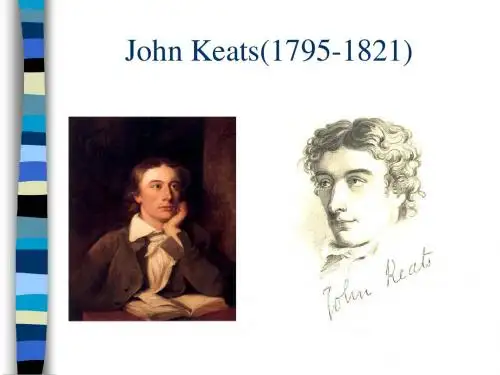
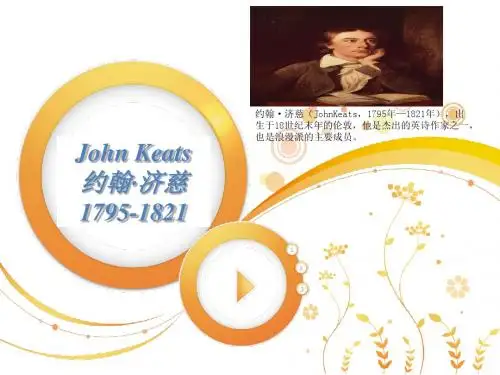
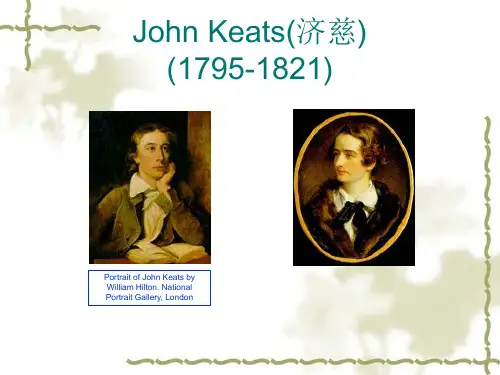
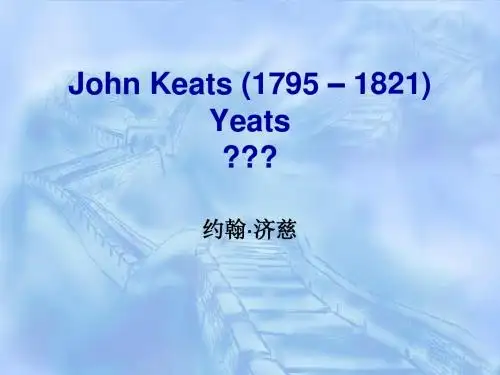
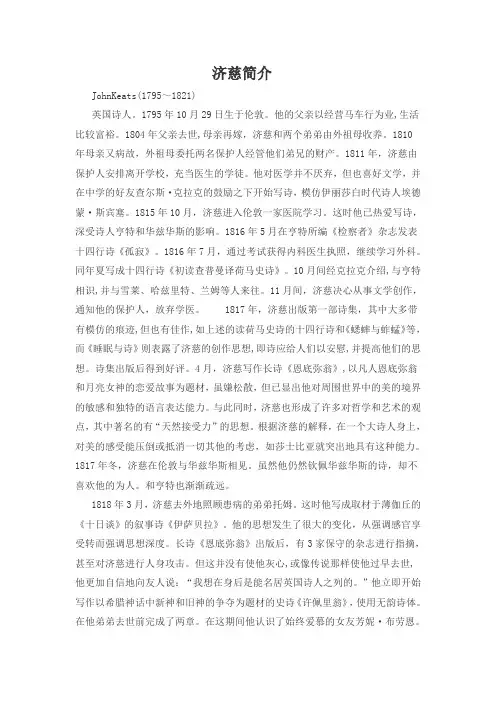
济慈简介JohnKeats(1795~1821)英国诗人。
1795年10月29日生于伦敦。
他的父亲以经营马车行为业,生活比较富裕。
1804年父亲去世,母亲再嫁,济慈和两个弟弟由外祖母收养。
1810年母亲又病故,外祖母委托两名保护人经管他们弟兄的财产。
1811年,济慈由保护人安排离开学校,充当医生的学徒。
他对医学并不厌弃,但也喜好文学,并在中学的好友查尔斯·克拉克的鼓励之下开始写诗,模仿伊丽莎白时代诗人埃德蒙·斯宾塞。
1815年10月,济慈进入伦敦一家医院学习。
这时他已热爱写诗,深受诗人亨特和华兹华斯的影响。
1816年5月在亨特所编《检察者》杂志发表十四行诗《孤寂》。
1816年7月,通过考试获得内科医生执照,继续学习外科。
同年夏写成十四行诗《初读查普曼译荷马史诗》。
10月间经克拉克介绍,与亨特相识,并与雪莱、哈兹里特、兰姆等人来往。
11月间,济慈决心从事文学创作,通知他的保护人,放弃学医。
1817年,济慈出版第一部诗集,其中大多带有模仿的痕迹,但也有佳作,如上述的读荷马史诗的十四行诗和《蟋蟀与蚱蜢》等,而《睡眠与诗》则表露了济慈的创作思想,即诗应给人们以安慰,并提高他们的思想。
诗集出版后得到好评。
4月,济慈写作长诗《恩底弥翁》,以凡人恩底弥翁和月亮女神的恋爱故事为题材,虽嫌松散,但已显出他对周围世界中的美的境界的敏感和独特的语言表达能力。
与此同时,济慈也形成了许多对哲学和艺术的观点,其中著名的有“天然接受力”的思想。
根据济慈的解释,在一个大诗人身上,对美的感受能压倒或抵消一切其他的考虑,如莎士比亚就突出地具有这种能力。
1817年冬,济慈在伦敦与华兹华斯相见。
虽然他仍然钦佩华兹华斯的诗,却不喜欢他的为人。
和亨特也渐渐疏远。
1818年3月,济慈去外地照顾患病的弟弟托姆。
这时他写成取材于薄伽丘的《十日谈》的叙事诗《伊萨贝拉》。
他的思想发生了很大的变化,从强调感官享受转而强调思想深度。
to autumn by john keats的解析
《To Autumn》是英国浪漫主义诗人约翰·济慈的一首著名诗作。
该诗以三个十四行的雄辩诗结构(帕特尔诗)写成,描绘了秋天的美景和生命的虚无。
整首诗的第一段描绘了秋天的景象,以及大地和大自然的丰收。
济慈通过描绘叶子风中摆动、谷仓簇拥的庄稼和葡萄园的景象,创造了一个安静、平和的秋天画面。
通过运用惯用语言、韵脚和隐喻,济慈传达了秋天的美丽和富饶。
第二段描述了秋天给人们带来的喜悦和宁静。
济慈提到了“麦
浪颤抖在热潮的海滩上”,让读者感受到秋天的生机和活力。
他还描述了一位收割者休息的场景,表达了一个人因为秋天的到来而感到快乐和满足的心情。
最后一段强调了生命的无常和短暂。
济慈提到了人们正在节日气氛中欢笑,但最终一切都会结束。
他暗示了生命的逝去,通过描述太阳逐渐下山和羊群回归家园的景象,传达了终极的虚无感。
济慈通过以柔和、富有感情的语言来描述秋天的景象,展现了他对自然和生命的深刻思考。
他通过描绘秋天的景象来提醒人们珍惜生命,即使无常的虚无感也不应使人沮丧。
该诗以其美丽的描写和寓意深刻的主题而闻名,被广泛认为是英国浪漫主义诗歌的经典之作。
通过对自然和生命的描绘,它人性化地表达了人们对生命的观察和感受。
John Keats 名词解释1. 引言约翰·济慈(John Keats)是英国浪漫主义时期最著名的诗人之一。
他以其感性、富有想象力和美丽的诗歌而闻名于世。
本文将对John Keats进行全面详细、完整且深入的解释,探讨他的生平、作品和影响。
2. 生平约翰·济慈于1795年10月31日出生在伦敦一个工人阶级家庭中。
他从小就展现出对艺术和文学的兴趣,并在早年受到了古典希腊文化和罗马神话的影响。
然而,他的父亲去世后,家庭陷入贫困,这使得他不得不放弃学业并找工作来支持家庭。
尽管如此,济慈坚持追求自己的文学梦想,并在1818年发表了他的第一本诗集《奥德与其他诗篇》。
这本诗集虽然没有取得商业上的成功,但为济慈赢得了一些批评家和同行诗人的赞誉。
然而,在1820年代初期,济慈的生活受到了许多不幸的打击。
他失去了他深爱的兄弟汤姆,同时自己也被诊断出患有结核病。
面对这些困难,济慈决定放弃医学事业,全身心地投入到写作中。
然而,他的健康状况不断恶化,最终在1821年2月23日去世,享年仅25岁。
尽管他的生命非常短暂,但他留下了一系列优秀的诗歌作品,成为了英国文学史上不可忽视的重要人物。
3. 作品约翰·济慈一生中创作了许多优秀的诗歌作品。
以下是他最著名和具有代表性的几首诗歌:3.1《致太阳》(“To Solitude”)这首诗探讨了孤独和自我反思对于个体成长和内心平静的重要性。
济慈通过描绘大自然和内心世界之间微妙而美丽的联系来表达这种思想。
3.2《秋天时节》(“To Autumn”)这首诗是济慈最后完成的作品之一,也是他最著名的作品之一。
它描述了秋天的美景和大自然变迁的景象,以及对时光流逝和生命短暂的思考。
3.3《希腊古物》(“Ode on a Grecian Urn”)这首诗是济慈最受欢迎和广为人知的作品之一。
它探讨了艺术与现实生活之间的关系,并通过描绘一个古希腊花瓶上的画面,表达了对美、时间和永恒存在的思考。
《致夏威夷生日贺诗》(To Autumn)是英国浪漫主义诗人约翰·济慈(John Keats)最出名的一首诗。
该诗描绘了初秋的丰收景象,以及自然界的宁静和和谐,充满了诗人对生命和自然的虔诚之情。
下面将从诗歌的主题、结构和语言等方面分析《致夏威夷生日贺诗》,探究其文学价值和艺术魅力。
一、主题分析1. 《致夏威夷生日贺诗》主要描绘了初秋的丰收景象,诗中描述了麦田、苹果园和葡萄园里丰收的景象,以及蜜蜂和蚂蚁在劳作。
诗人通过对自然界细致入微的观察,表现了丰收的喜悦和生命的顽强。
2. 诗人也借此表现了对自然的赞美之情,诗中充满了对自然的敬畏和敬重。
诗人把自然赋予了生命,赋予了感情,表达了对自然的深情厚意。
二、结构分析1. 《致夏威夷生日贺诗》共有3个十四行的仿古古典诗体,包括奥德斯通詩韵。
每一个十四行又可以细分为1组四行诗和一组十行诗。
韵律是abab、cde和cde。
2. 诗歌的整体结构非常紧凑,采用了押韵和对仗的手法,语言简洁、优美,音调和谐。
诗人巧妙地运用修辞和象征手法,使整个诗歌在形式上更加完美,增强了诗歌的艺术感染力。
三、语言分析1. 《致夏威夷生日贺诗》的语言优美、流畅、质朴,充满了浪漫主义的情感色彩。
诗中充满了丰富的意象,如“麦田”、“苹果园”、“葡萄园”等,充分展现了初秋的景象和丰收的欢乐。
2. 诗人运用了大量的修辞手法,如比喻、拟人、排比等,增强了诗歌的表现力和感染力。
诗中的语言简练、含蓄,在展现丰收景象的也蕴含了诗人对生命和自然的感怀与赞美。
结语《致夏威夷生日贺诗》是约翰·济慈的代表作之一,具有极高的文学价值和艺术魅力。
通过对初秋丰收景象的描绘,诗人展现了对自然的歌颂和赞美,表达了对生命的热爱和向往。
该诗以其优美的语言、丰富的意象和深刻的内涵,深受读者的喜爱和推崇。
济慈以其对自然与生命的独特感悟,留下了永恒的文学价值,成为英国浪漫主义诗歌的经典之作。
《致夏威夷生日贺诗》(To Autumn)是英国浪漫主义诗人约翰·济慈(John Keats)的代表作之一,该诗以其优美的语言、丰富的意象和深刻的内涵而备受推崇。
诗人约翰·济慈与浪漫主义文学的表达概述约翰·济慈(John Keats)是19世纪英国著名的浪漫派诗人,他通过其作品深刻地描绘了对自然、爱情和艺术的热烈追求以及对人生苦难和死亡的敏感体验。
本文将探讨约翰·济慈如何在他的诗歌中表达了浪漫主义文学的核心观念。
自然的崇拜约翰·济慈是一个对自然非常敏感而又虔诚崇拜的诗人。
他在许多诗作中通过精细而生动的描写展现了自然界的美丽和神秘。
例如,在他最著名的诗作《秋意》中,他描述了大自然渐进变化中不同季节所赋予的景象和情感,以此呼唤读者与自然相连。
这种对自然界深深倾注情感并从中获得启示力量的态度也体现了浪漫主义文学关于个体与大自然相互依存关系的观点。
爱情的力量在约翰·济慈的诗歌中,爱情是另一个重要的主题。
诗人通过对爱情的表达,探讨了真爱的力量和魔力。
他追求纯粹、无私、永恒的爱情,相信它是人类尤其是艺术家创作和生活的灵感源泉。
在诗作《纪念具体》中,他写道:“美为最佳辅助/因风暴而消失”来表达爱情之美即使短暂也能带来无限的喜悦和充实感。
对艺术与文学的追求约翰·济慈对艺术和文学才华有着深刻渴望,并将自己定位为一个真正表达内心情感并触动读者心灵的诗人。
他通过深入研究古代希腊文学以及英国伟大文化传统,吸收其中精华,并将其转化为自己作品中细腻多样化的表达方式。
例如,在《大教堂建筑失火颂》一诗中,他描绘了巨大火灾下教堂被摧毁的景象,表达了自己对艺术创作的无尽忧虑和追求。
面对死亡的诗意约翰·济慈在短暂的一生中面临着许多苦难和健康问题。
这种面对死亡威胁时他依然保持诗意的态度也成为了他诗歌表达的重要主题之一。
他深知生命的有限性和必然性,因此在不少作品中表达了积极地与死亡共存以及享受当下的观点。
例如,在《秋日之曲》中,他将自己与落叶进行比喻,在描述落叶即将凋零时,借此探讨人类生命流逝不可避免但又有一种无法言喻美感。
以上是关于诗人约翰·济慈与浪漫主义文学的表达的简要介绍。
诗人约翰济慈的简介诗人约翰济慈的简介诗人约翰济慈的简介约翰·济慈(John Keats),英诗作家,1795年10月31日出生于英国伦敦,浪漫派的主要成员。
1818年到1820年是济慈诗歌创作的鼎盛时期,他先后完成了《伊莎贝拉》、《圣亚尼节前夜》等作品。
1821年2月,济慈在罗马病逝。
父亲是马厩的雇工领班。
自幼喜爱文学,由于家境窘困,不满16岁就离校学医。
其父母在其青少年时期便相续去世,虽然与兄弟和姐姐相互支持,但过早失去父母的悲伤始终影响着他。
在埃菲尔德学校(EnfieldSchool),济慈接受了传统正规的教育,在阅读和写作方面,济慈受到了师长克拉克(CharlesCowdenClarke)的鼓励。
年轻的济慈非常钟爱维吉尔(Virgil),14岁时,他将维吉尔的长诗《艾涅阿斯纪》("Aeneid")翻译成英语。
1810年,济慈被送去当药剂师的学徒。
五年后济慈考入伦敦的一所医学院,但没有一年,济慈便放弃了从医的志愿,而专心于写作诗歌。
济慈很早就尝试写作诗歌,他早期的作品多是一些仿作,1817年,济慈的第一本诗集出版。
这本诗集受到了一些好的评论,但也有一些极为苛刻的攻击性评论刊登在当时很有影响力的一本杂志(Blackwood`smagazine)上。
济慈没有被吓倒,他在来年的春天复印了新诗集《安迪密恩》(“Endymion”)。
1818年夏天,济慈前往英格兰北部和苏格兰旅行,途中得到消息说他的兄弟汤姆得了严重的肺结核,济慈即刻赶回家照顾汤姆。
这一年年底,汤姆死了,济慈搬到一个朋友在汉普斯泰德(Hampstead)的房子去住,现在人们已将那所房子认为济慈之家。
在那里,济慈遇见并深深的爱上了一位年轻的女邻居,芬妮·布朗(FannyBrawne)。
在接下来的几年中,疾病与经济上的问题一直困扰着济慈,但他却令人惊讶的写出了大量的优秀作品,其中包括《圣艾格尼丝之夜》《秋颂》《夜莺颂》《拉弥亚》和《致秋天》等名作,表现出诗人对大自然的强烈感受和热爱,赢得巨大声誉。